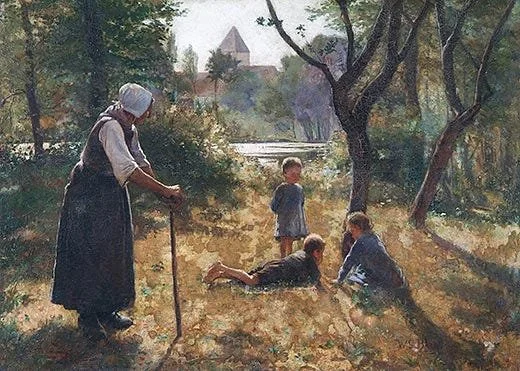[Sometimes I can’t help myself: therefore time for something by one of my favorite authors. Nudge, nudge! I highly recommend that if you enjoy this essay, you should seek out his online magazine:
“Word & Song is an online magazine devoted to reclaiming the good, the beautiful, and the true. We publish six essays each week, on words, classic hymn, poems, films, and popular songs, as well a weekly podcast, alternately Poetry Aloud or Anthony Esolen Speaks. To support this project, please join us as a free or paid subscriber.”]
On Time"
John Milton
JULY 19
“Time is money,” people have been saying in English for at least 300 years, but I prefer what the strangely perspicacious little boy in Dickens’ Dombey and Son said to that man of business who begot him: “Father, what is money?” And the father was taken aback. He pulled up short, and then he told him, with great seriousness, though the boy did not understand it, that money was the most powerful thing in the world. Mr. Dombey did not know that the Son he had planned to be at his side, in his imagination, in his management of time, would never live to be a partner of Dombey and Son. “Fool,” said the Lord to the rich man who thought he was the lord of his own time, so that he could live easy on the wealth he had accumulated, “even this night thy soul shall be required of thee.”
When I look back in time on the glimmers of beauty in my boyhood, I see that none of them have to do with wealth or prestige or the pursuit of heady pleasures. They are like the light, not to be hoarded or grasped, but to be grateful for: the wild cornflowers I picked for my mother from a vacant lot; the inscription “Gloria in Excelsis Deo,” painted high up in the nave of the church I attended when I was seven, long since torn down; Ernie Ford singing “Sixteen Tons,” on one of the few records my parents owned; my mother singing softly in the kitchen while I lay on the floor a few feet away, in our tiny living room, absorbed in drawing a comic strip (I was four years old then). Somehow it seems to me that these moments are more permanent than the Twin Towers or the Colossus of Rhodes or the pyramid of Cheops. Maybe “permanent” is the wrong word. The moments seem to be within time but outside of it, beside it; and we have the promise of God that nothing truly good will be lost forever.
[“Time Flies,” William Gerard Barry. Public Domain.]
That’s why Milton’s poem “On Time” has always moved me so deeply. You might think it is just an intellectual’s exercise in distinguishing between the things that pass away, the gross things that weigh us down, and the everlasting things. But I think it is a brave challenge to Time, which he personifies, and to us all when we are tempted to live as if time were all in all — time, and the things we use time to acquire, such as Mr. Dombey’s idol, money, and other ultimately foolish and disappointing idols. It’s foolish to give yourself over to what devours itself, as Time does. It is to miss the heart of love and joy.
The poem is in the form of a stanza from an Italian canzone, made up of long lines and short lines, somewhat irregularly interspersed, and often the rhymes are irregular too. Milton’s rhymes are quite regular, as you’ll see, with the first eight lines divided nicely into groups of four, followed by rhyming couplets, and then ending with four lines that rhyme ABBA. But when you read it, you don’t think of stanzas and couplets nicely rounded off, because Milton varies the lengths of the lines, driving us on through the poem with impressive force. Then we come to the final line of all, which is a stroke of sheer poetic genius. It’s a six-beat line, when all the long lines before it have only five beats, and yet there’s a strong stop after the fifth beat, leaving the simple words “O Time” hanging — as if you’d pause right before them, narrow your eyes, and address that ultimate loser, sardonically. “You aren’t much, then, are you?” you say — “O Time.”
FLY, envious Time, till thou run out thy race;
Call on the lazy leaden-stepping hours,
Whose speed is but the heavy plummet's pace;
And glut thyself with what thy womb devours,
Which is no more than what is false and vain,
And merely mortal dross;
So little is our loss,
So little is thy gain.
For when as each thing bad thou hast entombed,
And last of all thy greedy self consumed,
Then long Eternity shall greet our bliss,
With an individual kiss;
And Joy shall overtake us as a flood,
When every thing that is sincerely good
And perfectly divine,
With truth, and peace, and love, shall ever shine,
About the supreme throne
Of Him, to whose happy-making sight alone,
When once our heavenly-guided soul shall climb,
Then, all this earthly grossness quit,
Attired with stars, we shall for ever sit,
Triumphing over Death, and Chance, and thee, O Time.
